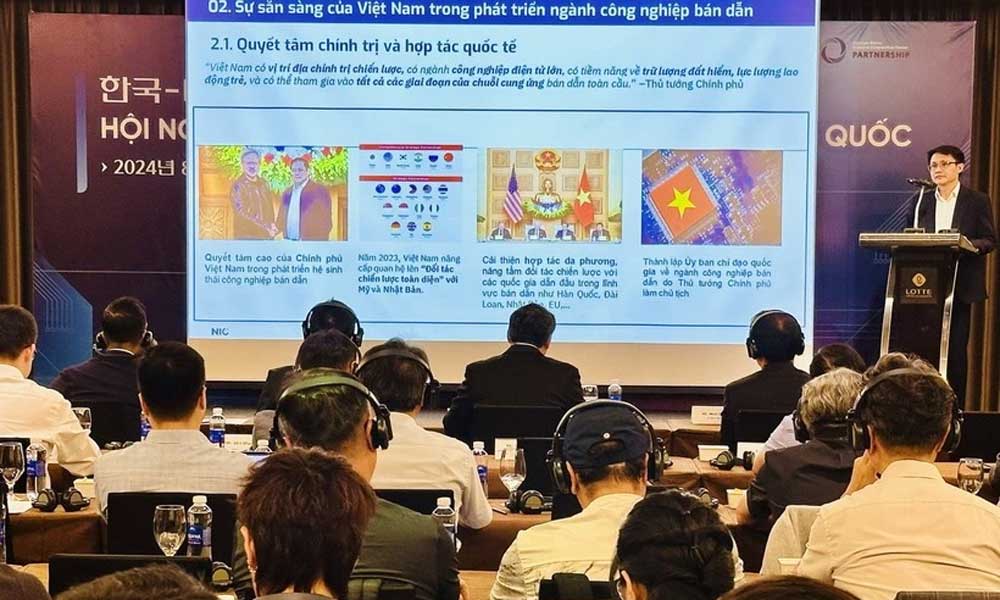Vietnamese students gain hands-on experience in semiconductor production in Taiwan
Sixteen Vietnamese students recently participated in a two-week program at National Cheng Kung University in Taiwan, where they studied both the theoretical and practical aspects of semiconductor chip production.
This marks the first time Vietnamese students have attended this course, with participants coming from Vietnam National University in both Hanoi and Ho Chi Minh City.
 |
|
International students in a room where chips are manufactured at the Taiwan Semiconductor Research Institute. |
Vo Thien Nhan, a student from the Faculty of Electrical and Electronics Engineering at the University of Technology, Vietnam National University in HCMC, shared that the program, which took place from July 17 to early August, focused on two main topics: chip design and digital/analog integrated circuit design.
Like many of his peers, Nhan joined the course with the desire to witness modern chip production processes firsthand and to observe how Taiwan trains its students. He was surprised to find that many engineers, master's, and PhD students from countries such as South Korea, Japan, India, the U.S., and the Netherlands were also participants.
National Cheng Kung University is one of Taiwan's top five universities, and the course Nhan attended is the third of its kind organized by the university.
Duc Minh, a student from the Faculty of Electronics and Telecommunications at the University of Science, Vietnam National University, HCMC, noted that the course provided extensive knowledge about the steps involved in chip production, including design, manufacturing, testing, and packaging. He found the course innovative, as domestic programs mainly focus on design.
"I got to enter the room where chips are manufactured and see for myself technologies and machinery that I had previously only seen online," he said.
Both students mentioned that the program covered their airfare, visa costs, and a portion of their tuition fees. The remaining amount they had to pay was around $1,000 per person.
During the course, Nhan and Minh practiced chip design using Electronic Design Automation tools, which are crucial for modern integrated circuit design. This allowed them to familiarize themselves with the process from circuit design to simulation.
According to Nhan, the chip design knowledge taught in Taiwan is not significantly different from what is taught by their professors in Vietnam. However, students in Taiwan have easier access to advanced design software. The course was divided into two classes: digital and analog chip design. Additionally, students had the opportunity to enter fabrication and testing labs at various research institutes and companies to observe and learn directly.
"What impressed me the most was seeing my design go into production, resulting in a circuit board, and then carrying out post-production steps to evaluate the strengths and weaknesses of the design," Nhan shared.
Many nights, Nhan stayed late in the lab to complete his assignments and learn how to use new design software. He is now considering pursuing further studies in semiconductor technology.
Taiwan currently supplies more than half of the world's semiconductor chips. In March, the Taiwan Education Bureau announced the International Talent Education Program (INTENSE) for students from Vietnam, Indonesia, and the Philippines. With support from businesses and universities in Taiwan, international students receive sponsorship for airfare, tuition, and a monthly living allowance of TWD10,000 ($310) to study engineering and semiconductors.
Students who have graduated from vocational schools or colleges, participants in joint programs between Vietnamese and Taiwanese universities, or master's and PhD candidates are eligible to apply. Upon graduation, they will be awarded bachelor's, master's, or PhD degrees corresponding to their program of study.
In its first year, the program aims to recruit 2,000-2,500 Vietnamese students, with enrollment starting in February or September.
Professor Tran Hoa Hien, Education Counselor at the Taipei Economic and Cultural Office in HCMC, believes that with a complete ecosystem and abundant human resources, Taiwan can support Vietnam in training professionals in semiconductor chip design.
Source: VnExpress
 Bắc giang
Bắc giang













Reader's comments (0)